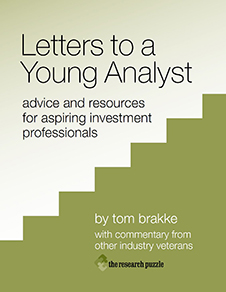
- Sunday, April 17th, 2016
- starting somewhere
-
“You have to start somewhere.”
I hear that quite a lot when I ask why those trying to select managers begin with some kind of a performance screen.
In fact, if you read the materials of firms who are in the business of selecting managers, you’ll often see similar statements. For example, from Litman Gregory: “We have to start somewhere and so, like everyone else, we often begin by screening for funds with compelling long-term track records.”Litman Gregory | The article is titled, “How We Seek to Identify Great Active Managers.”
“Like everyone else.” Yes, it is the place where almost everyone starts. At least “long-term” was in there with italicized emphasis; that is a bit more defensible, but only modestly so. Another pieceLitman Gregory | This is a more step-by-step overview of the firm’s approach. from the same firm contained this warning, also in italics, “The problem is that past performance is of little use in identifying funds or managers who will deliver superior future performance relative to their peer group.” A few paragraphs down, the description of its research process begins, “Step One: Performance Screens.”
Litman Gregory is not alone in presenting this conflicting message and in proceeding in a way that ensures that past performance has a greater impact on the selection of managers than advertised. I have evaluated a large number of allocators over the last year and most of them — including “the big names” — fall into the same trap.
I recently gave a presentation to the 2016 CFA Institute Wealth Management Conference on “Rethinking Due Diligence and Manager Selection.” One of my themes was that performance chasing remains prevalent throughout the investment ecosystem, with institutional asset owners, advisory firms, those who chose subadvisors for mutual funds, fund of funds managers, and other allocators continuing to chase, despite the fact that it flies in the face of what works.
(Lauren Foster of CFA Institute posted a nice reviewEnterprising Investor | This site features a great mix of articles on a wide variety of investment topics authored by practitioners and members of the staff of CFA Institute. of other aspects of the presentation, especially the need for genuine discovery in the due diligence process.)
If you ask those involved in manager selection how much performance counts in their decision making, you tend to get an answer like “around twenty or thirty percent,” and sometimes even less. However, if the very first step in the evaluation process is a performance hurdle, in actuality performance becomes the primary governor on the entire effort and is therefore the dominant factor. Without past performance, you don’t get into the ring.
It’s no wonder why allocators start there. Nothing compares with the ease of a performance screen to cut the universe of possibilities down to size. (In fact, many screens include a myriad of performance metrics that make the constraints very tight, as if being more precise in filtering redeems the flawed premise of the exercise.) Faced with a large number of potential managers, nothing culls the herd quite so quickly as screening, even though that means that many prized bulls of the future are left out and a lot of bum steers who were lucky in the past are kept in.
In my view, performance chasing has been designed into the decision processes of most organizations. It starts with our natural behavioral instincts — our fear of career risk as individuals and business risk in our organizations — which prevent us from presenting prospective managers to others if those managers haven’t done well previously.The Prudent Fiduciary Digest | My speech included some killer quotes from Jason Hsu that can be found in an edition of my newsletter for institutional investors, under the heading of “Breaking from the pack.” Unfortunately, we extend the problem by building structural reinforcements of those tendencies into our organizations, none more pervasive and pernicious than the screens that are run, without much thought at all, to kick things off.
What’s the alternative?
Almost all organizations involved in manager selection talk about the need for a thorough qualitative evaluation of a manager, and substantial resources are devoted to the documentation and assessment of the characteristics of managers. But it’s very rare to find an allocator who actually starts with the qualitative aspects of a firm and works from there. It’s a lot harder to do and rooting your approach in that way presents you with some major dilemmas.
Are you really going to buck convention and stick your neck out to recommend a firm that you think has all of the attributes for future success if the numbers on the page are substandard? Or, do you want to be in a position of saying “no” when a manager is shooting the lights out (and being selected by everyone else), just because you grade it lower than others on subjective factors?
Ironically, those are likely exactly the right things to do, but we aren’t built to do them and our organizations aren’t either. So we keep trodding the same ground, selecting from those screened past winners, despite the evidence that it doesn’t work.
Yes, you need to start somewhere. Somewhere else. It’s lonely there, but that’s where the real opportunities lie.
